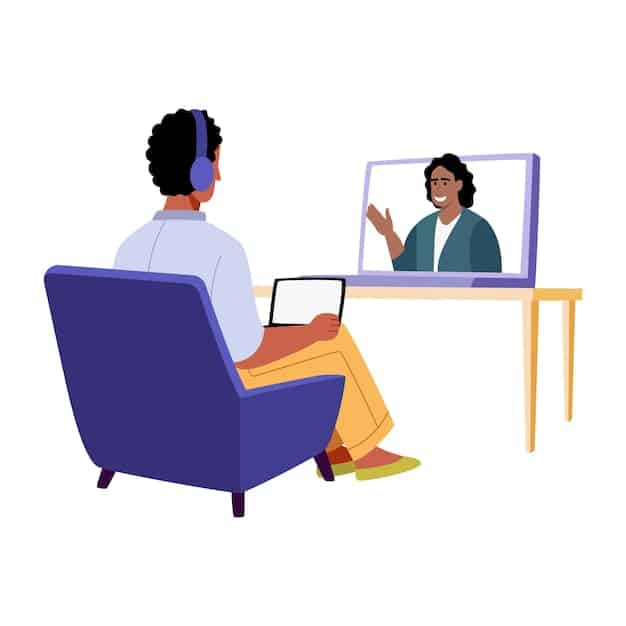How to Find a Therapist: Your Step-by-Step Guide

Finding the right therapist involves assessing your needs, researching potential therapists, verifying credentials, and scheduling initial consultations to ensure a good fit for your mental health journey.
Navigating the world of mental health care can feel overwhelming, especially when you’re trying to find the right support. This step-by-step guide, how to find a therapist, aims to simplify the process, empowering you to take control of your mental well-being.
Understanding Your Needs
Finding the right therapist begins with understanding your own needs and goals for therapy. What are you hoping to achieve through therapy? What specific issues or challenges are you facing? Reflecting on these questions will help you narrow down your search and find a therapist who is a good fit.
Identifying Your Primary Concerns
Before you start searching, spend some time identifying the primary concerns that led you to seek therapy. Are you struggling with anxiety, depression, relationship issues, or something else? Understanding your core issues will help you find a therapist with expertise in those areas.
Setting Realistic Goals
Therapy is a journey, not a quick fix. Setting realistic goals will help you stay motivated and track your progress. Discuss your goals with your therapist during your initial consultation to ensure that they align with their approach.
- Write down your concerns: Documenting your feelings can provide clarity.
- Prioritize your needs: Determine which concerns are most pressing.
- Be honest with yourself: Acknowledge your vulnerabilities and strengths.
Ultimately, understanding your needs and setting realistic goals are critical first steps in finding the right therapist for you. It provides a foundation for a successful therapeutic relationship.
Researching Potential Therapists
Once you have a solid understanding of your needs, it’s time to start researching potential therapists. There are several resources available to help you find qualified professionals in your area.
Online Directories
Online directories like Psychology Today, GoodTherapy.org, and Find A Therapist offer extensive lists of therapists, allowing you to filter by location, specialization, insurance, and other criteria.
Referrals from Trusted Sources
Ask your primary care physician, friends, family members, or other healthcare providers for referrals. Personal recommendations can be incredibly valuable.
Verifying Credentials
Before committing to a therapist, verify their credentials and licensure through your state’s licensing board. This ensures that they have the proper training and qualifications to practice therapy.

Exploring online directories, seeking referrals from trusted sources, and verifying credentials are essential steps in building a list of potential therapists, ensuring a qualified and trustworthy selection.
Checking Credentials and Specializations
Before scheduling a consultation, it’s essential to verify a therapist’s credentials and ensure their specializations align with your needs. This step can significantly impact the effectiveness of your therapy.
Understanding Different Types of Therapists
Different mental health professionals have varying degrees and areas of expertise. Common types include:
* **Psychiatrists:** Medical doctors who can prescribe medication.
* **Psychologists:** Professionals with doctoral degrees specializing in psychological testing and therapy.
* **Licensed Professional Counselors (LPCs):** Counselors with master’s degrees who provide therapy.
* **Licensed Clinical Social Workers (LCSWs):** Social workers with specialized clinical training.
Verifying Licenses and Certifications
Check with your state’s licensing board or regulatory body to ensure the therapist’s license is valid and in good standing. This process often involves searching online databases or contacting the board directly.
Matching Specializations to Your Needs
Not all therapists are the same. Do they specialize in areas like anxiety, depression, PTSD, or relationship issues? Matching their expertise to your specific needs is crucial for effective therapy.
Seeking out a therapist who is fully licensed and specializes in the areas you need support with is a good way to ensure the therapy process is as effective as possible.
Preparing for Initial Consultations
You’ve narrowed down your list of potential therapists, and now it’s time to prepare for the initial consultations. These meetings are crucial for determining if the therapist is the right fit for you.
Creating a List of Questions
Prepare a list of questions to ask each therapist during the consultation. Some examples might include:
* What is your therapeutic approach?
* What experience do you have with my specific issues?
* What are your fees and payment options?
* How long do you typically work with clients?
Clarifying Insurance and Payment Options
Understand the therapist’s fees and insurance coverage before scheduling the consultation. Some therapists may accept insurance, while others may be out-of-network or private pay.
Managing Expectations
The initial consultation is a two-way street. You are evaluating the therapist, and they are evaluating whether they can effectively help you. Be open and honest about your needs.
- Outline your goals: Clearly communicate what you hope to achieve in therapy.
- Share pertinent history: Provide relevant background information to help the therapist understand your situation.
- Ask about their approach: Understand their therapy style and methods.
Thorough preparation is key for making the most of your initial consultations. Knowing what to ask and understanding the practical aspects of therapy ensure you make an informed decision.
Assessing Compatibility and Therapeutic Approach
During your initial consultations, pay close attention to how you feel around each therapist. Compatibility and alignment of therapeutic approach are vital for a successful therapeutic relationship.
Evaluating Your Comfort Level
Do you feel comfortable and safe sharing your thoughts and feelings with the therapist? A strong therapeutic relationship requires trust and openness.
Understanding Different Therapeutic Approaches
Familiarize yourself with different therapeutic approaches like Cognitive Behavioral Therapy (CBT), Psychodynamic Therapy, and Humanistic Therapy. Ask therapists about their preferred approach and how it might benefit you.
Trusting Your Gut Instinct
Sometimes the best way to assess compatibility is by trusting your gut instinct. If something feels off, it’s okay to move on to another therapist.

Ultimately, listening to your intuition and honestly assessing your compatibility with the therapist will lead you to the best fit, fostering a productive and effective therapeutic journey.
Making Your Decision and Starting Therapy
After you have had several initial consultations, it’s time to make your decision. Consider all the factors discussed and choose a therapist who feels like the right fit for you.
Weighing All Factors
Consider factors such as the therapist’s expertise, therapeutic approach, fees, and your overall comfort level. Make a pros and cons list if it helps you make a decision.
Scheduling Your First Appointment
Once you have made your decision, schedule your first therapy appointment. This is the first step in your journey towards improved mental well-being.
Remaining Open and Committed
Therapy can be challenging, but it can also be incredibly rewarding. Remain open and committed to the process, and communicate openly with your therapist about your progress and any concerns you may have.
* **Schedule weekly or bi-weekly sessions:** Regular sessions help maintain momentum.
* **Be patient:** Progress may not be immediate; allow time for the therapeutic process to unfold.
* **Engage actively:** Participate in discussions, complete homework assignments, and reflect on your progress between sessions.
Making the decision to start therapy is a significant step toward improving your mental well-being. By staying committed and engaging actively in the process, you can unlock your potential for growth and healing.
| Key Point | Brief Description |
|---|---|
| 🔍 Identify Needs | Assess personal challenges and therapy goals. |
| 👩⚕️ Research Therapists | Use directories and referrals to find potential therapists. |
| 📝 Prepare Questions | List questions to ask during consultations. |
| ✅ Trust Instinct | Choose a therapist you feel comfortable and safe with. |
Frequently Asked Questions
▼
If you’re experiencing overwhelming feelings of sadness, anxiety, or difficulty coping with daily life, therapy can be a beneficial resource. It’s a proactive step towards improving your mental health.
▼
Look for a licensed therapist whose expertise matches your needs. Consider their therapeutic approach, fees, and your comfort level. A good fit is crucial for successful therapy.
▼
The duration of therapy varies. Some people benefit from short-term therapy (a few months), while others require longer-term support (a year or more). It depends on your specific goals and progress.
▼
Yes, online therapy can be just as effective as in-person therapy for many mental health conditions. It offers convenience and accessibility, making it a great option for those with busy schedules.
▼
It’s okay to switch therapists if you don’t feel a connection. Your comfort and trust are paramount. Discuss your concerns with your therapist or seek a new one who better meets your needs.
Conclusion
Finding the right therapist can be a journey, but by understanding your needs, researching potential therapists, and assessing compatibility, you can take control of your mental health and find a professional who can support you. Remember, prioritizing your mental well-being is an investment in yourself.





